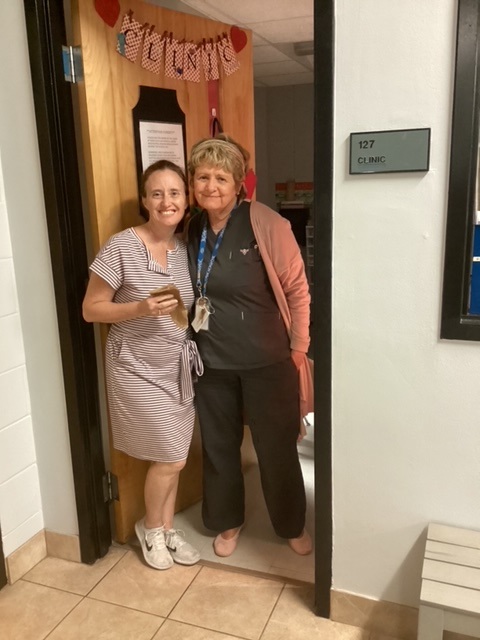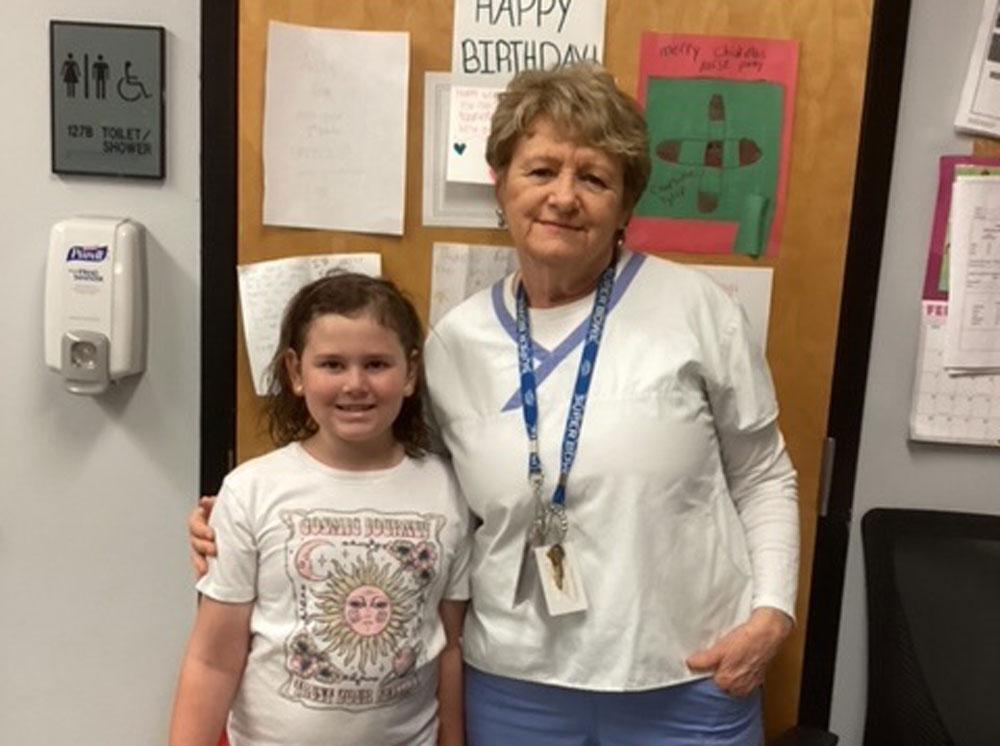With School Nurse Appreciation Day just around the corner on May 8, it's time to celebrate the extraordinary nurses who help keep students at St Johns County Schools healthy and thriving.
Patty Dennis, a beloved member of the Cunningham Creek Elementary team, shared her perspective on what it’s like to be a nurse in a St Johns County School.
Patty, what is a typical day like for you?
I start my day at 4:30 in the morning, walking and feeding our two high-maintenance dachshunds. I arrive at school around 7:30, with student medication administration starting at 7:45. Usually, it is nonstop in the clinic. A good day is when I can fit lunch in between students. I always try to leave around 3:30…if possible.
What part of your job do you like the most?
One of the most enjoyable parts of my day is seeing the smiling faces of the many students who pop into the clinic just to say hello or give me a hug. At Cunningham Creek Elementary, we have very caring staff and students. When I was hired many years ago, the principal said we are a family. That statement is still true today!
In your role as a school nurse, have you been involved in any emergencies?
Except for the past two years, I was the Exceptional Student Education (ESE) nurse. This includes the brightest to the lowest functioning students. Many were medically compromised. For example, I managed students with different types of seizures that required frequent emergency medications given within minutes. There were so many emergencies in the ESE classrooms…clearing blocked tracheostomy tubes and dealing with autistic children who also have diabetes.
Now that I am primarily in the school clinic, I see many broken arms and legs. However, the most challenging children are asthmatic children. I had one little guy come to me struggling to breathe. I did not have doctor’s orders or medication, even though I had requested them many times. His parents couldn’t be reached. Rescue was called…when they arrived, they were ready to intubate. That is the worst feeling as a nurse…knowing what life-saving intervention a student needs, yet you don’t have [permission to give] it.

Do you also deal with personal issues?
There was a student in third grade whom the teacher sent to the clinic many times due to his personal hygiene. The odor on his clothes was horrendous. The guidance counselor and I worked together to help this child. We would give him clean clothes from the clinic and wash his in the school’s machine. Many calls were made to his mother with no positive outcome. Visits were made to their home. Animals were defecating throughout the house and on the student’s clothes. Eventually, the student went to live with his father.
How do you cultivate a level of trust with your students?
Cultivating a relationship with students entails more than just handing out Band-Aids or medication; it requires being a steadfast support system, especially during a time of need or crisis, especially with our students with emotional behavior disorders.
By establishing trust and open communication, I can create an environment where students feel comfortable reaching out for help when they need it most. Whether it’s providing a listening ear or simply being a reassuring presence, being there for students in their time of need fosters a sense of security and belonging that is essential for their overall well-being.
What is the most tiring part of the job?
By far, the most exhausting part of nursing in the school system is the paperwork. During the first month or more, we all spend at least 12 hours a day trying to get organized. Also, with every student who enters the clinic, we are required to document our assessment in the student’s electronic medical record. Sometimes I feel I’m interacting with the computer more than the student.
How do you interact with the parents?
Keeping parents informed about their child’s health status and any injuries or illnesses that happen during the school day.
Working with parents to develop health care plans. Especially for students with chronic health conditions or special medical needs. Understanding and empathizing with parents’ concerns and providing support and reassurance as needed. Being available to answer their questions and address their concerns. Overall, maintaining open and respectful communication is key!
Thank you, Patty, for your many years of service. We appreciate you and all of the nurses who play a vital role in St Johns County Schools.









